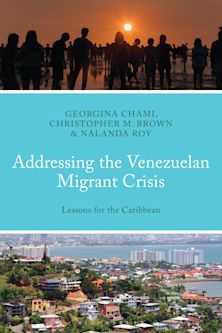- Home
- ACADEMIC
- Politics & International Relations
- Politics - Other
- Foreign Policy Toward Cuba
Foreign Policy Toward Cuba
Isolation or Engagement?
Michele Zebich-Knos (Anthology Editor) , Heather Nicol (Anthology Editor) , Sahadeo Basdeo (Contributor) , Jan Knippers Black (Contributor) , Sung-Chang Chun (Contributor) , Douglas Friedman (Contributor) , Hugh Gladwin (Contributor) , Cedric Grant (Contributor) , Guillermo J. Grenier (Contributor) , Brett Heindl (Contributor) , John M. Kirk (Contributor) , Hal Klepak (Contributor) , Soraya Castro Marino (Contributor) , Peter McKenna (Contributor) , Renee G. Scherlen (Contributor) , Lana Wylie (Contributor)
Foreign Policy Toward Cuba
Isolation or Engagement?
Michele Zebich-Knos (Anthology Editor) , Heather Nicol (Anthology Editor) , Sahadeo Basdeo (Contributor) , Jan Knippers Black (Contributor) , Sung-Chang Chun (Contributor) , Douglas Friedman (Contributor) , Hugh Gladwin (Contributor) , Cedric Grant (Contributor) , Guillermo J. Grenier (Contributor) , Brett Heindl (Contributor) , John M. Kirk (Contributor) , Hal Klepak (Contributor) , Soraya Castro Marino (Contributor) , Peter McKenna (Contributor) , Renee G. Scherlen (Contributor) , Lana Wylie (Contributor)
This product is usually dispatched within 3 days
- Delivery and returns info
-
Free CA delivery on orders $40 or over
You must sign in to add this item to your wishlist. Please sign in or create an account
Description
Foreign Policy Toward Cuba examines the disagreement between the foreign policy-making communities of the United States and Canada and that of Cuba and the Caribbean region. The book contrasts the differing Cuban foreign policy positions taken by the United States and Canada, contrasting them in turn with Caribbean and Cuban positions on North America. The book uses a wide range of perspectives, paying particular attention to the way the Western Hemisphere understands Cuba and the approaches of Cuban and Caribbean foreign policy toward North America. Of interest to students of Latin America, Cuba, and foreign policy and international relations, the book provides a clear interpretation of the complex foreign policy between nations.
Table of Contents
Chapter 2 U.S. Policy toward Cuba: Trends and Transformation During the George W. Bush Administration
Chapter 3 The US-Cuba Standoff: A Double Con?
Chapter 4 Canada-Cuba Relations: Old Wine in New Bottles?
Chapter 5 From Reasonable Steadiness to "from Crisis to Crisis": Mexico-Cuba Relations in the Post-Cold War Era
Chapter 6 Cuba-CARICOM Relations Since 1972: Challenge and Change in Regional Cooperation
Chapter 7 Carribean Community and Cuba Relations: Thirty Years Revisited
Chapter 8 The Exile Ideology: Popular Culture and Boundary Maintenance in the Cuban Enclave
Chapter 9 From Miami With Love: Transnational Political Activism in the Cuban Exile Community
Chapter 10 The Cuba-United States Conflict: Notes for Reflection of the War Against Terrorism
Chapter 11 Civil Society in Contemporary Cuba: U.S. Policy and the Cuban Reality
Chapter 12 "Venceremos!" Castro's Discourse on Cuba's Foreign Policy
Chapter 13 A Clash of Perspectives?: Some Conclusions About the "Cuba Problem"
Product details
| Published | Sep 09 2005 |
|---|---|
| Format | Paperback |
| Edition | 1st |
| Extent | 298 |
| ISBN | 9780739112410 |
| Imprint | Lexington Books |
| Dimensions | 227 x 153 mm |
| Series | Studies in Public Policy |
| Publisher | Bloomsbury Publishing |
About the contributors
Reviews
-
Since Castro's revolution, the United States has tried to overthrow, isolate, or undermine Cuba, while Canada, Mexico, and the Caribbean have preferred engagement. Michele Zebich-Knos and Heather Nicol have assembled a superb group of scholars to describe the domestic causes and evaluate the international effects of these different approaches. This is an important book that takes a new approach to an old problem and emerges with a curious conclusion: neither confrontation nor engagement has worked.
Robert A. Pastor, professor and director of the Center for North American Studies, American University
-
The editors have assembled an extremely qualified group of scholars in the rich field of Cuban studies. Their treatments are balanced and authoritative and go beyond the Havana-Washington axis to cover the whole hemisphere. No other source provides such an exhaustive account of how Cuban-U.S. relations became and remain so contentious.
Michael L. Conniff, Director of Global Studies at San José State University
-
Much of it is useful, perceptive and timely, and the best of the contributions are very good, justifying the whole publication.
Latin American Studies
-
I highly recommend Foreign Policy toward Cuba: Isolation or Engagement? It should be required reading for anyone interested in foreign policy, international relations, Latin American studies, and politics in general.
The Latin Americanist
-
This is a wonderful exploration of the myriad facets of an increasingly important question. The book is comprehensive, well-written, and a useful resource for policy-makers and students.
Kirk Bowman, Georgia Tech



































